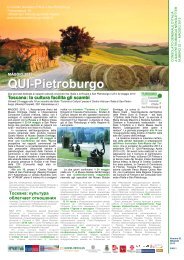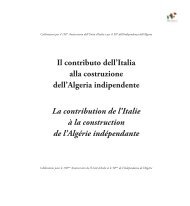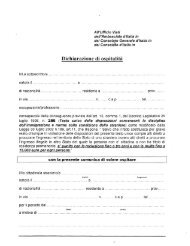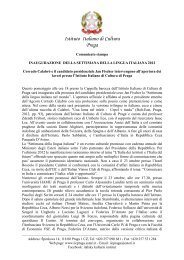Investment in Italy
Investment in Italy
Investment in Italy
- No tags were found...
Create successful ePaper yourself
Turn your PDF publications into a flip-book with our unique Google optimized e-Paper software.
<strong>Investment</strong> <strong>in</strong> <strong>Italy</strong>subject to tax <strong>in</strong> a state or territory that is not on the ‘black list’).With specific regard to controlled EU entities, the CFC <strong>in</strong>come can only be avoided if thetaxpayer can prove (a tax rul<strong>in</strong>g is mandatory) that the foreign entity is not an artificialstructure aimed at achiev<strong>in</strong>g an undue tax advantage.The <strong>in</strong>come subject to tax <strong>in</strong> <strong>Italy</strong> is computed by apply<strong>in</strong>g the Italian rules <strong>in</strong> the case ofa controlled foreign entity; <strong>in</strong> the case of an associated entity it can also be determ<strong>in</strong>ed byapply<strong>in</strong>g given coefficients to the book value of certa<strong>in</strong> assets. The accounts of the foreignentity should be duly certified by an <strong>in</strong>dependent audit firm. Taxation is applied separately(i.e. available tax loss carryforwards cannot shelter the CFC <strong>in</strong>come).Dividends orig<strong>in</strong>ally paid by a non-EU entity pass<strong>in</strong>g only the bus<strong>in</strong>ess vitality test are subjectto full taxation <strong>in</strong> the hands of the ultimate Italian resident recipient (i.e. no participationexemption), while those paid by an entity pass<strong>in</strong>g the subject to tax test qualify for the (95percent) exemption.Participation exemption on capital ga<strong>in</strong>s (transfer of shares)Capital ga<strong>in</strong>s realized on the disposal of shares <strong>in</strong> foreign entities are treated just likedomestic ga<strong>in</strong>s. In addition, the 95 percent exemption is also conditional upon a three-yearperiod of residency <strong>in</strong> a ‘white-list’ country.Participation exemption on <strong>in</strong>bound dividendsDividends paid by countries that will not be <strong>in</strong>cluded <strong>in</strong> the ‘white list’ (i.e. that are <strong>in</strong>cluded<strong>in</strong> the ‘black list’ today) are generally taxable at the full corporate <strong>in</strong>come tax rate unless arul<strong>in</strong>g has been obta<strong>in</strong>ed (subject to tax test).Anti-hybrid rules: the 95 percent dividend exemption is granted on condition that thepayment is not tax deductible by the non-resident payer (as declared by the payer).5.1.12 Foreign tax creditsTaxes paid on foreign source <strong>in</strong>come are credited up to the amount of IRES due, whichcorresponds to the ratio of foreign <strong>in</strong>come to total <strong>in</strong>come (net of any tax loss carryforward).The limit applies per country (baskets).The credit is claimed <strong>in</strong> the tax return filed for the year when the foreign <strong>in</strong>come is declaredand the foreign tax paid is def<strong>in</strong>itive. Should that <strong>in</strong>come be partially exempt (as, for example,foreign dividends) the foreign tax is reduced proportionally. More favourable conditions maybe available under double tax treaty provisions.Excess foreign tax credits may be carried forward or backward for eight years.Specific rules apply <strong>in</strong> the case of domestic/worldwide tax consolidation.Many of the tax treaties <strong>in</strong> force with <strong>Italy</strong> still <strong>in</strong>clude ‘match<strong>in</strong>g credit’ or ‘tax spar<strong>in</strong>g’clauses, which allow Italian <strong>in</strong>vestors to credit notional foreign taxes, irrespective of the actualor lower payments <strong>in</strong> the country of source (due, for <strong>in</strong>stance, to local tax <strong>in</strong>centives).© 2012 KPMG S.p.A., KPMG Advisory S.p.A., KPMG Fides Servizi di Amm<strong>in</strong>istrazione S.p.A., KPMG Audit S.p.A., Italian limited liability share capital companies, and Studio Associato Consulenza legale e tributaria, anItalian professional partnership, are member firms of the KPMG network of <strong>in</strong>dependent member firms affiliated with KPMG International Cooperative (“KPMG International”), a Swiss entity. All rights reserved.49
















